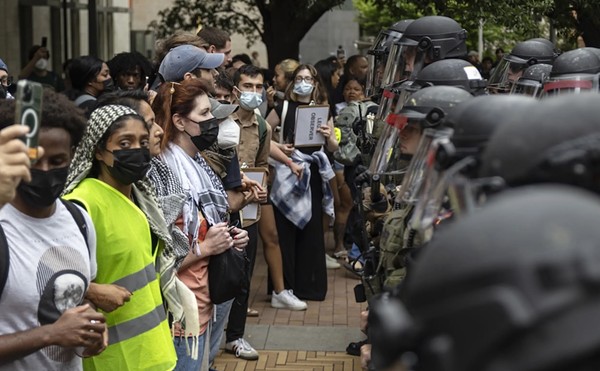Bosque in the light
Were Queque scripting the show, we’d have a carnival barker knee-deep in the marsh, maybe a tattered Uncle Sam top hat in implausible balance. Into the rich muck of El Paso’s Rio Bosque Wetlands Park falls ash from a bobbing cigarette as the figure cries out to a passing peregrine falcon, two stationary white-faced ibis, and an unflappable burrowing owl.
“Her-ray! Her-ray! Her-ray! One day own-lay! See the beauty of a varn-ishing wilderness before evil migrant scape-goatin’ closes the curtain far evah!”
A shy beaver pokes her head from the reeds as a family of deer mice collect on drier land up-gradient. Red-rimmed horned-lizard eyes shimmer in the sun.
“That’s right, friends! Novemba eleven is the date to rememba: Yer last chance before the Wall of Death descends!”
This past weekend marked two years since Bush signed the Secure Fence Act, requiring impenetrable fencing and walls to close off hundreds of miles of Texas-Mexico riverfront. Protesters gathered in San Antonio, Brownsville, and El Paso to keep the opposition flame burning in public view.
On November 11, El Paso area activists are taking a more sedate approach, offering four guided walks of the city’s park, now beginning to brim with restored wetlands thanks to the hard work of professors and students from the Center for Environmental Resource Management at the University of Texas at El Paso. While owned by the city, the 372-acre park is managed by UTEP. With Border Wall equipment beginning to arrive, and nearby construction going seven days a week, El Muro del Odio is expected to soon rend the park asunder, making wetlands habitat a moot point.
Worse comes to worse, Que2 says we paratroop in some Alamo City Rollergirls (whose Prim Reapers brought some of the roughest derby action we’ve seen in years to SA’s Rollercade this weekend). Place your money on Homeland Security’s contractors at your peril! Concluding this fantasy, we hear a roller skate’s back brake connect with skull and a video recorder tumbles from a shock of ocotillo. Contract surveillance just met Alamo City’s own Pleasure 2Beat Ya!
Money in wartime
While you were out enjoying a drive in the country for the first time in months thanks to the global recession’s collapsing oil prices, Bank of America was celebrating, too. But while your simple pleasures came with mechanical motion and a couple cold ones at a nearby icehouse, it takes a bit more to make a bank smile these days.
That’s where Congress came in, siphoning your tax money into bailouts to Freddie and Fannie and an assortment of banking titans — more than a trillion dollars worth, to date. Since propping up Countrywide criminals and buying out Merrill Lynch, Bank of America has raked in $20 billion in free bailout money — soon to be followed with a federal $5 billion “thank you” bonus for graciously taking over Merrill Lynch.
A military salute to Bank of America’s San Antonio-based overseas division arrived this month in the form of a $7.1 million deal (worth potentially as much as $35 million over several years) to keep U.S. troops and private mercenaries abroad in the credit game.
Meanwhile, Valero Energy Corp. has kept both feet firmly anchored in wartime profits, bagging a new contract this month with the U.S. Department of Defense worth $234.7 million. The national oil giant and hometown hero redeemed itself, at least in the eyes of your humble Queque, by kicking that shady Kuwaiti oil company back down the Top Ten list of war-enabling oil providers.
According to the Defense Energy Support Center, Valero’s war contracts have grown from greeted-as-liberators levels of $314 million in 2003 to 2007’s impressive $1 billion bash. Valero’s total revenue last year was $95 billion.
While Valero’s military sales are an improvement of $340 million over ’06, it’s still only half of the war sales enriching top-slot holder Royal Dutch Shell, sitting at a cool $2.1 billion. (Kuwait Petroleum Corporation dropped from fourth to seventh place, with $431 million in sales.)
So, come on, Valero. It’s only a matter of time before still-nationalized-in-name Iraqi oil starts flooding to international oil cartels like Shell and Exxon. Get your war on!
In other contract news: San Antonio’s Center for Disease Detection stands to make as much as $37 million testing members of the U.S. Navy and Marine Corps for HIV. CDD’s new contract with the DOD locks in almost $7 million this year for blood testing, with the possibility of another five to come.
Get out the hope
Say what you want about the seemingly endless 2008 election cycle, but voter apathy is not among its problems. A week into early voting, the numbers in Bexar County are pretty staggering: more than 209,000 early and absentee votes cast, up nearly 70 percent from 2004. Across the state the early ballots exceed 1.7 million, also a jump of nearly 70 percent from four years ago.
Across the country, massive early turnout is being taken as a positive sign for Barack Obama’s campaign, but as Obama’s Texas director Juan Sepulveda told the Queque this week, “Texas is a little different.” (Big early voting in the Lone Star State traditionally means the GOP is getting out its base.)
At this point, it’s a given that John McCain will carry the state, so Sepulveda has focused on two goals that don’t hinge on an Obama victory in Texas: Encouraging Texas Democrats to head to nearby battleground states such as New Mexico, Colorado, and Florida to help the Obama effort there; and “increasing the number of votes Obama receives and closing the gap `in Texas` so we can have an impact on the down-ballot races.”
Sepulveda is convinced that the 2010 national census will result in Texas picking up three or four Congressional districts and says that Obama feels strongly about helping the Democratic Party gain enough seats in the Texas Legislature to head off GOP redistricting plans.
Sepulveda is touting Harris County as the story to watch for Texas Dems, predicting that the party, which currently has zero elected officials from the area, will have more than 30 office-holders after November 4.
Sepulveda also holds out some hope that Rick Noriega can pull off an unlikely upset of incumbent John Cornyn in their U.S. Senate race. At least in terms of fundraising, Noriega has more in common with McCain than Obama. Much like McCain, he’s facing an opponent with six times as much cash on hand for the final, deal-closing push, and he’s had to ration his TV-ad buys while Cornyn is free to flood the airwaves. Sepulveda suggests that if Libertarian candidate Yvonne Schick “can take two or three percent of the vote away” from Cornyn, and South Texas Latinos come out in big numbers, Noriega may yet shock the pundits and the pollsters. Be advised: Don’t bet the house on it. •

















